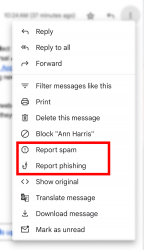main content Anti-spoofing measures in Gmail
On Monday, August 5, IT will enable advanced security settings in Google to display in-message warning banners for messages that may be spoofing a sender from Lewis & Clark College. Learn more about this initiative and see the warning messages you may encounter.
Gmail Anti-Spoofing Warning Banners
As of August 5, 2024, Gmail may display a warning banner titled “Be careful with this message” when it suspects an email is spoofing a sender from Lewis & Clark College.
Email spoofing occurs when an email is designed to impersonate a legitimate sender, often as part of a phishing attempt. These emails might appear to come from someone at Lewis & Clark or from an external source, but their intent is malicious.
These in-message banners will look something like this.

What to do with phishing messages:
- If you suspect the message is phishing but want to be sure, reach out directly to the person or organization using verified contact information.
-
If you confirm the email is spam or phishing, click on the kebab menu (three vertical dots menu in the upper right corner) and select “Report Spam” or “Report Phishing”.

Be aware of these warning signs of phishing:
The message may have an unusual “From” address or an unusual “Reply-To” address rather than our “@lclark.edu” address. Examples of unusual emails are: fao.lclark.edu@gmail.com | LCPresident@icloud.com | Lewis&Clark@hotmail.com | LCDeanofStudents@yahoo.com
- Phishing messages are often delivered outside normal business hours such as 3 a.m..
- Monthly bills delivered mid cycle.
- The subject line of the email is irrelevant or does not match the message content.
- The email is about something you never requested or a receipt for something you never purchased.
- The message is not personalized. Valid messages from banks and other legitimate sources usually refer to you by name.
- There are grammar or spelling errors.
- The email is asking you to look at compromising or embarrassing pictures of yourself or someone you know.
- The email requests payment to people or organizations via services such as Venmo or Zelle.
- You have an uncomfortable feeling, or it just seems odd or illogical.
When contacting you about financial or other sensitive information, Lewis & Clark will never:
- Ask you to email sensitive personally identifiable information such as a tax return, W-2, or Social Security Number (whole or partial).
- Charge a fee to process a financial aid application (this is a common scam).
- Process payments related to tuition, payroll, or expense reimbursements via cash transfer apps such as Venmo or Zelle.
- Request payment via gift cards.
- Request your password.
Information Technology is located in Watzek Library on the Undergraduate Campus.
MSC: 97
email ITservice@lclark.edu
voice 503-768-7225
fax 503-768-7228
Chief Information Officer Adam Buchwald
Information Technology
Lewis & Clark
615 S. Palatine Hill Road
Portland OR 97219
More Stories

Google Gemini & NotebookLM now available!
Google Gemini and NotebookLM—now available through your Lewis & Clark Workspace for Education account.
LCFiles offline for maintenance - March 28, 5 p.m. to March 30, midnight
LCfiles will be offline and unavailable while the Information Technology Infrastructure team migrates the data to a new storage array. This will enable us to continue to offer LCfiles as the premier destination for all your important Institutional storage needs.
If you are curious, you can read about Lewis & Clark’s storage recommendations.
If you have any questions, please do not hesitate to reach out to us via the Service Desk.

WiFi Infrastructure Maintenance - March 27 2025, 6am to 8am
The Information Technology Infrastructure group will be performing WiFi maintenance on March 27, 2025 from 6 a.m to 8 a.m. WiFi connections to PioNet, PioNet-Guest, and PioNet-Resident will be disrupted during this time.
If you have any questions, please do not hesitate to reach out to us via the Service Desk.